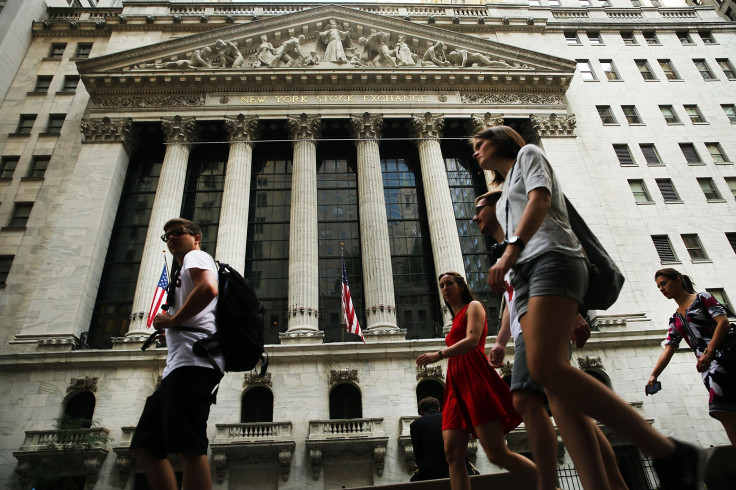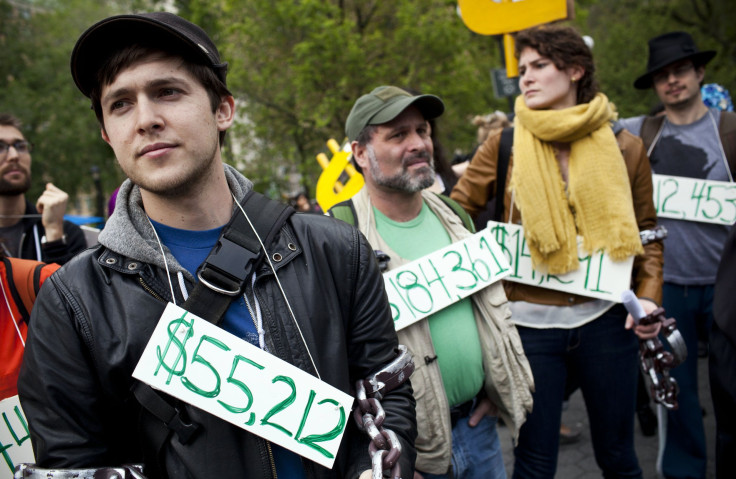As Market Mayhem Grips Investors, Fewer Americans Have A Stake In What Happens On Wall Street

As financial markets dip, crater and then surge once again, cable news networks are abuzz with frenzied analysis; pundits and investors alike offer up dozens of reasons for the sudden volatility; the Federal Reserve watches with bated breath. And all the while, much of the country is responding with a collective shrug.
That’s because fewer people are invested in the stock market today than at any time in nearly the last two decades -- the product of dogged wage stagnation and a dramatic loss of faith in markets. Data varies by source. But according to the U.S. Federal Reserve's most recent survey, only about 48 percent of Americans reported owning stocks or stock-based investments, down from a 2007 peak of 65 percent, according to Gallup. A more recent study released in April by consumer finance firm Bankrate.com found the same proportion as the Fed, which marks the lowest participation rate since 1995, when about 41 percent held some form of stock.
One is more likely to encounter a daily tea drinker in the United States than someone with money invested in the stock market -- and that includes so-called nondirect investments like mutual funds held in 401(k) accounts. Even fewer Americans, about 14 percent, own individual stocks like Apple or Microsoft. About twice as many people own dogs or tablet computers. More smoke cigarettes than own individual shares in publicly traded companies.
On the one hand, it’s because of wage stagnation. People aren’t going to invest when they don’t have any savings. Over the last year, average hourly earnings have barely kept up with inflation. And since the dark days of the Great Recession, pay for working class people has essentially stayed the same, even as the unemployment rate has dropped.
But that doesn’t account for the full picture. Even people with the means to invest are steering clear of Wall Street. When asked what kind of investments “made the most sense,” more people said real estate or cash--savings accounts or certificates of deposit--than stocks, according to a separate Bankrate.com survey released last month.
“People are still very squeamish about the volatility of the stock market,” says Greg McBride, chief financial analyst at Bankrate. “The recession of 2008 is still fresh in a lot of people’s memories.”
These post-recession jitters, McBride says, are “counter to what we’ve seen in previous cycles”--periods in which stock market participation grew as economic confidence returned.
That’s in part because of the sheer size of the recession, the worst since the Great Depression. What’s harder to quantify, though, is the corresponding loss of faith.
By American standards, confidence in the marketplace remains unusually shaky, according to Richard Wolff, an economics professor at the New School. People today don’t have as much faith as they once did in the hordes of economists and financial gurus encouraging them to invest. Not only did this pack of experts fail to predict the recession, but they’ve consistently underestimated the agony of the recovery: “We were told it would be short and shallow, and here it is, neither short nor shallow,” says Wolff.
Many share a feeling that the rules of the game are rigged or that it’s too risky to invest savings in a system they cannot possibly understand. News stories highlight the growing use of mind-numbingly complex algorithms and automated trading systems. Episodes like the 2010 Flash Crash--an unexpected 1,000-point nosedive that critics have blamed on the rise of high-frequency traders -- reinforce the perception that Wall Street is for the "big boys" alone.
“There’s a growing sense that the world of investing is for highly specialized, rich professions,” Wolff says. In the eyes of most people, “this is an extraordinarily difficult game in which the average person is underprepared, under-provisioned.”
Mass investment in the stock market is still a relatively recent phenomenon, with overall participation rates higher than they were in the 1980s and 1990s. But recent surveys suggest that's at risk: Only a quarter of people under the age of 30 are invested in the stock market, according to Bankrate.com.

The loss of faith is unfortunate, if understandable, according to McBride, since millennials bear such a heavy retirement burden. They’ll be living longer with mounting healthcare costs and declining access to pensions, to say nothing of the perpetual political uncertainties that loom over Social Security. Only higher-return investments like stocks and 401(k)s can deliver the level of savings today’s young people will need, he says.
That’s a tough ask, according to Brandon Rees, deputy director of the office of investment at the AFL-CIO, the nation’s largest labor federation. “They’re all in debt and they’re entering the worst job market since the Great Depression," he says.
“You want them to get back into the stock market?” says Wolff. “Then address the more urgent needs.”
© Copyright IBTimes 2024. All rights reserved.












